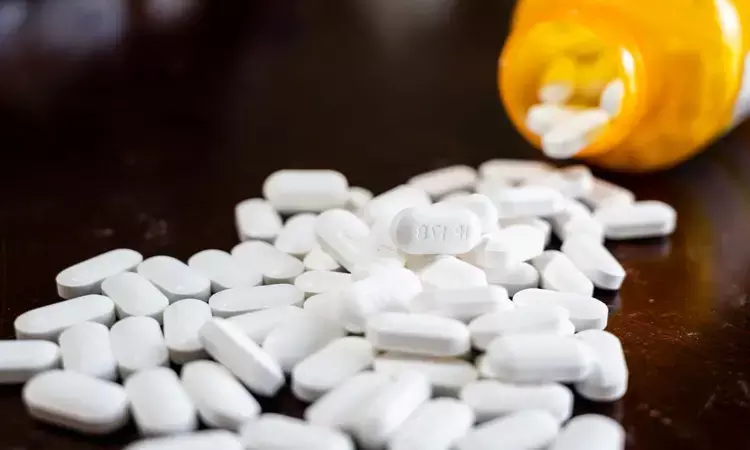- Home
- Medical news & Guidelines
- Anesthesiology
- Cardiology and CTVS
- Critical Care
- Dentistry
- Dermatology
- Diabetes and Endocrinology
- ENT
- Gastroenterology
- Medicine
- Nephrology
- Neurology
- Obstretics-Gynaecology
- Oncology
- Ophthalmology
- Orthopaedics
- Pediatrics-Neonatology
- Psychiatry
- Pulmonology
- Radiology
- Surgery
- Urology
- Laboratory Medicine
- Diet
- Nursing
- Paramedical
- Physiotherapy
- Health news
- Fact Check
- Bone Health Fact Check
- Brain Health Fact Check
- Cancer Related Fact Check
- Child Care Fact Check
- Dental and oral health fact check
- Diabetes and metabolic health fact check
- Diet and Nutrition Fact Check
- Eye and ENT Care Fact Check
- Fitness fact check
- Gut health fact check
- Heart health fact check
- Kidney health fact check
- Medical education fact check
- Men's health fact check
- Respiratory fact check
- Skin and hair care fact check
- Vaccine and Immunization fact check
- Women's health fact check
- AYUSH
- State News
- Andaman and Nicobar Islands
- Andhra Pradesh
- Arunachal Pradesh
- Assam
- Bihar
- Chandigarh
- Chattisgarh
- Dadra and Nagar Haveli
- Daman and Diu
- Delhi
- Goa
- Gujarat
- Haryana
- Himachal Pradesh
- Jammu & Kashmir
- Jharkhand
- Karnataka
- Kerala
- Ladakh
- Lakshadweep
- Madhya Pradesh
- Maharashtra
- Manipur
- Meghalaya
- Mizoram
- Nagaland
- Odisha
- Puducherry
- Punjab
- Rajasthan
- Sikkim
- Tamil Nadu
- Telangana
- Tripura
- Uttar Pradesh
- Uttrakhand
- West Bengal
- Medical Education
- Industry
Renoprotective effect of Metformin independent of blood sugar control in patients with diabetic kidney disease

China: A recent study published in Diabetes, Metabolic Syndrome and Obesity: Targets and Therapy revealed that metformin's renoprotective effect is independent of blood sugar control. The findings provide a new theoretical basis for diabetic kidney disease treatment with metformin.
Metformin treatment inhibited the epithelial-mesenchymal transition (EMT) process by the upregulation of vitamin D receptor (VDR) seen in renal tubular epithelial cells. VDR overexpression inhibited the EMT process. Mechanistic analysis revealed that metformin inhibits EMT by VDR upregulation in diabetic kidney disease (DKD).
"We found that metformin could reverse EMT by VDR upregulation, thereby inhibiting DKD development. Our findings provide a new rationale for the metformin's renal protective effect," Wenjie Wen from the University of Science and Technology of China in Hefei, People's Republic of China, and colleagues wrote.
Epithelial-mesenchymal transition plays a significant role in developing renal tubular damage in diabetic kidney disease. Metformin is utilized as a first-line drug for type 2 diabetes treatment. However, there is no clarity on the underlying mechanisms of EMT in DKD, and the inhibition of the process remains to be investigated.
C57 mice were divided randomly into four groups, including the type 2 diabetes group (T2DM group), the normal control group (NC group), the glibenclamide group (GLIB), and the metformin group (MET group). Glycated hemoglobin (HbA1c), fasting blood glucose (FBG), retinol-Binding Protein (RBP), creatinine, and podocalyxin (PCX) were measured. Renal pathology was seen with hematoxylin–eosin (HE) staining. The molecular mechanism of VDR expression is regulated by metformin through Western blot analysis of VDR, wound healing assay, Ecad, and SMA (smooth muscle actin) in HK2 cells.
The authors reported the following findings:
- In animal experiments, the T2DM group showed increased levels of HbA1c, FBG, UAlb/UCR, URBP/UCR, and UPCX/UCR, decreased body weight, reduced VDR protein levels and mRNA expression in renal tissues, and significantly increased pathological renal damage in mice in the T2DM group.
- Mice in the MET and GLIB groups had lower HbA1c, FBG, UAlb/UCR, URBP/UCR, and UPCX/UCR and higher body weight than the T2DM group.
- Renal pathological damage was remarkably reduced in the MET group than in the GLIB group.
- In HK2 cells, high glucose promoted VDR reduction and EMT development compared to the NC group. In addition, the authors found that metformin can up-regulate VDR and inhibit EMT.
"Our study reveals that the metformin's renoprotective effect is independent of blood sugar (glycemic) control, and metformin is involved in the EMT progression by regulating VDR expression," the authors concluded.
Reference:
Wen, Wenjie, et al. "Metformin Ameliorates Epithelial-Mesenchymal Transition of Renal Tubular Epithelial Cells in Diabetes By Increasing Vitamin D Receptor Expression." Diabetes, Metabolic Syndrome and Obesity : Targets and Therapy, vol. 15, 2022, pp. 4001-4010.
Dr Kartikeya Kohli is an Internal Medicine Consultant at Sitaram Bhartia Hospital in Delhi with super speciality training in Nephrology. He has worked with various eminent hospitals like Indraprastha Apollo Hospital, Sir Gangaram Hospital. He holds an MBBS from Kasturba Medical College Manipal, DNB Internal Medicine, Post Graduate Diploma in Clinical Research and Business Development, Fellow DNB Nephrology, MRCP and ECFMG Certification. He has been closely associated with India Medical Association South Delhi Branch and Delhi Medical Association and has been organising continuing medical education programs on their behalf from time to time. Further he has been contributing medical articles for their newsletters as well. He is also associated with electronic media and TV for conduction and presentation of health programs. He has been associated with Medical Dialogues for last 3 years and contributing articles on regular basis.
Dr Kamal Kant Kohli-MBBS, DTCD- a chest specialist with more than 30 years of practice and a flair for writing clinical articles, Dr Kamal Kant Kohli joined Medical Dialogues as a Chief Editor of Medical News. Besides writing articles, as an editor, he proofreads and verifies all the medical content published on Medical Dialogues including those coming from journals, studies,medical conferences,guidelines etc. Email: drkohli@medicaldialogues.in. Contact no. 011-43720751


